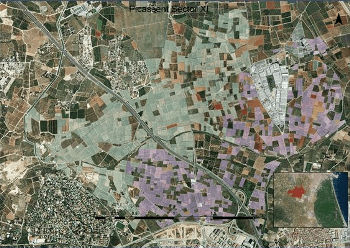Apr 13 2016
Scientists at the Universitat Politècnica de València (Polytechnic University of Valencia, UPV) have combined different remote sensing techniques in a system that can identify irrigation levels and needs in citrus cultivation.
 Cartography of irrigation needs in Valencia suburbs.
Cartography of irrigation needs in Valencia suburbs.
The project is the result of an experiment carried out by the Hydraulic Networks and Pressure Systems research group at the UPV’s Institute of Water and Environmental Engineering (IIAMA) with the goal of improving irrigation planning and the management of plant stress levels.
The IIAMA researchers drew on images provided by European and American remote sensing satellites to diagnose the irrigation status of each field, as well as other crop characteristics such as vegetation cover or plant vigor.
Professor Miguel Ángel Jiménez of IIAMA explains: “What we do is analyse the thermal imaging data obtained via satellite, which tells us the temperature of the crop and allows us to infer their hydraulic stress. The underlying methodology was developed in Holland and the US, but we took it and adapted it for citrus tree cultivation”.
The new system enables the precise calculation of plant stress levels, analysing real evapotranspiration rates and comparing them to the plants’ optimal hydration needs. This flags up stress levels outside the tolerance threshold due to over- or underwatering.
Furthermore, the system is almost entirely automated and enables monitoring on a very large scale, maximising overall production.
Weekly scheduling
Using this system allows irrigation to be scheduled on a weekly basis, adjusting the levels of water delivered to the crops in response to observed stress levels and weather forecasts for the coming days.
“This means that decisions can be made in the moment, diverging from traditional methods where decisions are made based on pre-existing climate data and not on what is expected to happen in the future” (Jiménez).
Water stress
IIAMA-UPV researcher Jiménez stresses that a crop being ‘stressed’ does not necessarily mean that it is in bad condition: “At certain times of the year, in the summer, for example, it is not a bad thing that a citrus plant is around 20 to 30% stressed; all this means is that the amount of water it is being supplied is 20 to 30% less than what has been established as creating optimal conditions of zero stress, and does not impact on final yields”.
Efficient use of water
Moreover, this model strives for an efficient use of water, one that enables maximum yields with minimum water levels. Indeed, Jiménez highlights that, after three years of scheduling irrigation across various plantations, their production has been confirmed as “higher than average”. To achieve this, he tells us, they issued a set of recommendations for each freeholding, indicating maximum and minimum water thresholds for each group of plants.
The system is currently being applied at the level of the local irrigators community in the Valencian municipality of Picassent, having already validated the model in collaboration with the Valencian Institute of Agrarian Research (IVIA) in Reva.
“Now we are looking to evaluate its usefulness for advising irrigator communities on optimal irrigation efficiencies for maximum productivity”, concludes Miguel Ángel Jiménez.
Source: http://ruvid.org/